Grundy County | |
|---|---|
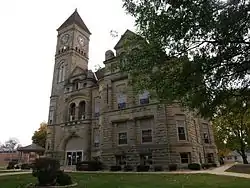 | |
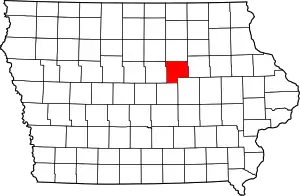 Location within the U.S. state of Iowa | |
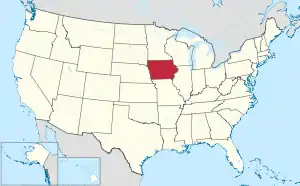 Iowa's location within the U.S. | |
| Coordinates: 42°24′06″N 92°47′15″W / 42.401666666667°N 92.7875°W | |
| Country | |
| State | |
| Founded | 1851 |
| Named for | Felix Grundy |
| Seat | Grundy Center |
| Largest city | Grundy Center |
| Area | |
| • Total | 502 sq mi (1,300 km2) |
| • Land | 502 sq mi (1,300 km2) |
| • Water | 0.04 sq mi (0.1 km2) 0.01% |
| Population (2020) | |
| • Total | 12,329 |
| • Density | 25/sq mi (9.5/km2) |
| Time zone | UTC−6 (Central) |
| • Summer (DST) | UTC−5 (CDT) |
| Congressional district | 4th |
| Website | www |
Grundy County is a county located in the U.S. state of Iowa. At the 2020 census, the population was 12,329.[1] The county seat is Grundy Center.[2] The county is named for Felix Grundy, former U.S. Attorney General.[3]
Grundy County is included in the Waterloo-Cedar Falls, IA Metropolitan Statistical Area.[4]
History
Grundy County was formed on January 15, 1851, and became self-governing in 1856. It was named after Felix Grundy of Tennessee, a statesman, Senator, member of the House of Representatives and Attorney General under President James K. Polk.
The first courthouse was built in 1861. The wooden, two-story building contained a courtroom, but was used for other purposes, including housing the office of the sheriff, county treasurer, the judge, as well as a chamber for the jury. The cornerstone for a second courthouse was laid on November 11, 1891.[5]
Geography
According to the U.S. Census Bureau, the county has a total area of 502 square miles (1,300 km2), of which 502 square miles (1,300 km2) is land and 0.04 square miles (0.10 km2) (0.01%) is water.[6]
Major highways
Adjacent counties
- Butler County (north)
- Black Hawk County (east)
- Tama County (southeast)
- Marshall County (southwest)
- Hardin County (west)
- Franklin County (northwest)
Demographics
| Census | Pop. | Note | %± |
|---|---|---|---|
| 1860 | 793 | — | |
| 1870 | 6,399 | 706.9% | |
| 1880 | 12,639 | 97.5% | |
| 1890 | 13,215 | 4.6% | |
| 1900 | 13,757 | 4.1% | |
| 1910 | 13,574 | −1.3% | |
| 1920 | 14,420 | 6.2% | |
| 1930 | 14,133 | −2.0% | |
| 1940 | 13,518 | −4.4% | |
| 1950 | 13,722 | 1.5% | |
| 1960 | 14,132 | 3.0% | |
| 1970 | 14,119 | −0.1% | |
| 1980 | 14,366 | 1.7% | |
| 1990 | 12,029 | −16.3% | |
| 2000 | 12,369 | 2.8% | |
| 2010 | 12,453 | 0.7% | |
| 2020 | 12,329 | −1.0% | |
| U.S. Decennial Census[7] 1790-1960[8] 1900-1990[9] 1990-2000[10] 2010-2018[11] | |||
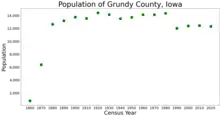
2020 census
The 2020 census recorded a population of 12,329 in the county, with a population density of 24.5631/sq mi (9.4839/km2). 96.97% of the population reported being of one race. 94.83% were non-Hispanic White, 0.40% were Black, 1.18% were Hispanic, 0.08% were Native American, 0.19% were Asian, 0.00% were Native Hawaiian or Pacific Islander and 3.33% were some other race or more than one race. There were 5,465 housing units, of which 5,069 were occupied.[1]
2010 census
The 2010 census recorded a population of 12,453 in the county, with a population density of 24.7816/sq mi (9.5682/km2). There were 5,530 housing units, of which 5,131 were occupied.[12]
2000 census
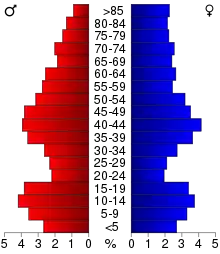
At the 2000 census,[13] there were 12,369 people, 4,984 households and 3,583 families residing in the county. The population density was 25 inhabitants per square mile (9.7/km2). There were 5,304 housing units at an average density of 11 per square mile (4.2/km2). The racial makeup of the county was 98.97% White, 0.08% Black or African American, 0.02% Native American, 0.29% Asian, 0.15% from other races, and 0.48% from two or more races. 0.58% of the population were Hispanic or Latino of any race.
There were 4,984 households, of which 30.70% had children under the age of 18 living with them, 63.80% were married couples living together, 5.50% had a female householder with no husband present, and 28.10% were non-families. 25.50% of all households were made up of individuals, and 14.20% had someone living alone who was 65 years of age or older. The average household size was 2.45 and the average family size was 2.94.
25.20% of the population were under the age of 18, 6.30% from 18 to 24, 25.10% from 25 to 44, 24.10% from 45 to 64, and 19.30% who were 65 years of age or older. The median age was 41 years. For every 100 females, there were 95.70 males. For every 100 females age 18 and over, there were 92.10 males.
The median household income was $39,396,] and the median family income was $46,627. Males had a median income of $32,006 and females $22,003. The per capita income was $19,142. About 3.30% of families and 4.60% of the population were below the poverty line, including 4.60% of those under age 18 and 5.70% of those age 65 or over.
Communities
Townships
Population ranking
The population ranking of the following table is based on the 2020 census of Grundy County.[1]
† county seat
| Rank | City/Town/etc. | Municipal type | Population (2020 Census) |
|---|---|---|---|
| 1 | † Grundy Center | City | 2,796 |
| 2 | Reinbeck | City | 1,662 |
| 3 | Dike | City | 1,304 |
| 4 | Conrad | City | 1,093 |
| 5 | Wellsburg | City | 720 |
| 6 | Holland | City | 269 |
| 7 | Stout | City | 191 |
| 8 | Beaman | City | 161 |
| 9 | Morrison | City | 98 |
Politics
Grundy County has long been one of the most consistently Republican counties in Iowa. The county has only voted for a candidate of a different party four times since the county was founded in 1851. The first occasion was in 1912, when former Republican Theodore Roosevelt won the county as the Progressive candidate. During his two landslide victories of 1932 and 1936, Franklin D. Roosevelt became the first Democrat to win Grundy County in its history. The final time a non-Republican candidate carried the county was in 1964, when Lyndon B. Johnson won in a nationwide landslide. No Democratic candidate has ever received more than 60% of the vote in the county, and in the last twenty elections (beginning in 1944), the Republican obtained at least 60% of the vote in fifteen of them, and the Republicans have hit at least 65% in nine of the twenty elections in that span.
| Year | Republican | Democratic | Third party | |||
|---|---|---|---|---|---|---|
| No. | % | No. | % | No. | % | |
| 2020 | 4,929 | 67.74% | 2,206 | 30.32% | 141 | 1.94% |
| 2016 | 4,527 | 65.88% | 1,856 | 27.01% | 489 | 7.12% |
| 2012 | 4,215 | 60.54% | 2,635 | 37.85% | 112 | 1.61% |
| 2008 | 3,945 | 57.77% | 2,790 | 40.86% | 94 | 1.38% |
| 2004 | 4,429 | 64.67% | 2,386 | 34.84% | 34 | 0.50% |
| 2000 | 3,851 | 63.02% | 2,139 | 35.00% | 121 | 1.98% |
| 1996 | 2,928 | 51.49% | 2,322 | 40.83% | 437 | 7.68% |
| 1992 | 3,160 | 51.33% | 1,895 | 30.78% | 1,101 | 17.88% |
| 1988 | 3,433 | 60.42% | 2,211 | 38.91% | 38 | 0.67% |
| 1984 | 4,527 | 69.45% | 1,915 | 29.38% | 76 | 1.17% |
| 1980 | 4,644 | 66.10% | 1,869 | 26.60% | 513 | 7.30% |
| 1976 | 4,173 | 62.66% | 2,410 | 36.19% | 77 | 1.16% |
| 1972 | 4,706 | 71.03% | 1,844 | 27.83% | 75 | 1.13% |
| 1968 | 4,866 | 71.14% | 1,675 | 24.49% | 299 | 4.37% |
| 1964 | 3,215 | 47.22% | 3,582 | 52.61% | 11 | 0.16% |
| 1960 | 4,989 | 69.62% | 2,174 | 30.34% | 3 | 0.04% |
| 1956 | 4,915 | 71.99% | 1,908 | 27.95% | 4 | 0.06% |
| 1952 | 5,652 | 78.98% | 1,483 | 20.72% | 21 | 0.29% |
| 1948 | 3,154 | 55.85% | 2,344 | 41.51% | 149 | 2.64% |
| 1944 | 3,625 | 62.14% | 2,191 | 37.56% | 18 | 0.31% |
| 1940 | 3,908 | 58.56% | 2,745 | 41.13% | 21 | 0.31% |
| 1936 | 2,656 | 39.62% | 3,918 | 58.45% | 129 | 1.92% |
| 1932 | 2,419 | 39.44% | 3,661 | 59.68% | 54 | 0.88% |
| 1928 | 3,671 | 69.03% | 1,620 | 30.46% | 27 | 0.51% |
| 1924 | 3,322 | 57.84% | 615 | 10.71% | 1,806 | 31.45% |
| 1920 | 4,662 | 85.82% | 714 | 13.14% | 56 | 1.03% |
| 1916 | 2,127 | 67.23% | 1,015 | 32.08% | 22 | 0.70% |
| 1912 | 421 | 13.60% | 1,149 | 37.12% | 1,525 | 49.27% |
| 1908 | 1,861 | 61.77% | 1,105 | 36.67% | 47 | 1.56% |
| 1904 | 2,021 | 66.55% | 938 | 30.89% | 78 | 2.57% |
| 1900 | 2,025 | 61.79% | 1,203 | 36.71% | 49 | 1.50% |
| 1896 | 1,894 | 60.36% | 1,206 | 38.43% | 38 | 1.21% |
See also
References
- 1 2 3 "2020 Census State Redistricting Data". census.gov. United states Census Bureau. Retrieved August 12, 2021.
- ↑ "Find a County". National Association of Counties. Archived from the original on May 31, 2011. Retrieved June 7, 2011.
- ↑ Gannett, Henry (1905). The Origin of Certain Place Names in the United States. Govt. Print. Off. pp. 145.
- ↑ United States Office of Management and Budget. "Update of Statistical Area Definitions and Guidance on Their Uses" (PDF). pp. 5, 36. Archived from the original (PDF) on May 14, 2006. Retrieved July 21, 2006.
- ↑ "Welcome to Grundy County". Archived from the original on February 17, 2008. Retrieved January 20, 2008.
- ↑ "US Gazetteer files: 2010, 2000, and 1990". United States Census Bureau. February 12, 2011. Retrieved April 23, 2011.
- ↑ "U.S. Decennial Census". United States Census Bureau. Retrieved July 17, 2014.
- ↑ "Historical Census Browser". University of Virginia Library. Retrieved July 17, 2014.
- ↑ "Population of Counties by Decennial Census: 1900 to 1990". United States Census Bureau. Retrieved July 17, 2014.
- ↑ "Census 2000 PHC-T-4. Ranking Tables for Counties: 1990 and 2000" (PDF). United States Census Bureau. Archived (PDF) from the original on March 27, 2010. Retrieved July 17, 2014.
- ↑ "State & County QuickFacts". United States Census Bureau. Archived from the original on June 7, 2011. Retrieved July 17, 2014.
- ↑ "Population & Housing Occupancy Status 2010" (PDF). United States Census Bureau American FactFinder. Archived (PDF) from the original on October 16, 2020. Retrieved August 15, 2022.
- ↑ "U.S. Census website". United States Census Bureau. Retrieved January 31, 2008.
- ↑ Leip, David. "Dave Leip's Atlas of U.S. Presidential Elections". uselectionatlas.org. Retrieved April 26, 2018.
External links
- Grundy County, Iowa Official website